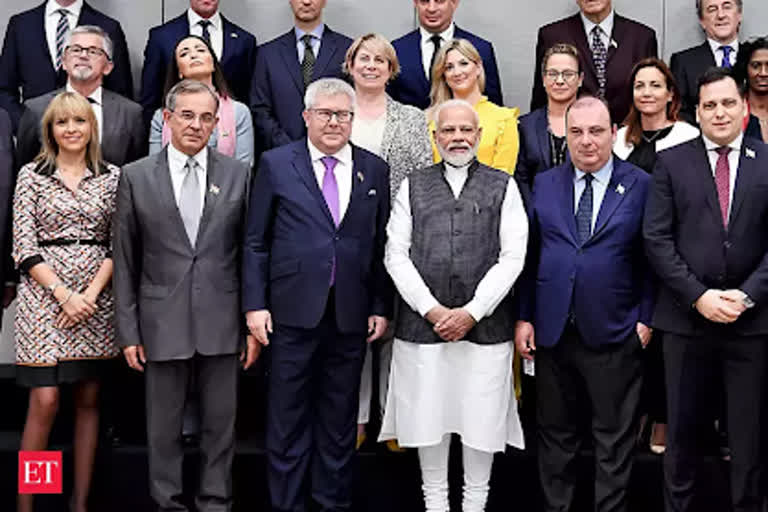BY AROONIM BHUYAN
New Delhi: Though a new high-level dialogue on trade and investment relations between India and the European Union (EU) has been set up to take forward negotiations for a free trade agreement between the two sides, such a pact that has been hanging fire for a long time now is still unlikely to fructify in the near future, experts said.
What is also working to India’s disadvantage is that Vietnam ratified an FTA with the EU only last month even as the two Asian countries are vying for access to the lucrative European market.
Prime Minister Narendra Modi, European Council President Charles Michel and European Commission President Ursula von der Leyen participated in the 15th India-EU Summit that was held July 15 via virtual mode during the course of which the two sides reviewed cooperation covering political and security relations, trade and investment, and economic cooperation.
Addressing the media following the summit, Vikas Swarup, Secretary (West) in the Ministry of External Affairs (MEA), said that one of the most important outcomes of the summit was the setting up of the High-Level Dialogue on Trade and Investment Relations, which will discuss all trade and market issues as well as supply chain linkages.
Swarup said that the leaders of the two sides discussed “in the context of the post-COVID economic recovery priorities on both sides, interests in the diversification of supply chain linkages, a strong emphasis on both sides for realising the full potential for trade and investment ties between India and the EU, and addressing trade-related issues on both sides”.
“Our Prime Minister emphasised the priority that we attach to attracting foreign direct investment (FDI) and continued efforts of the government of India to liberalise the regulatory environment as well as further improve the ease of doing business,” he said.
“He invited European businesses to utilise the opportunities in India and conveyed that Atmanirbhar Bharat is aimed at integrating domestic production in India to global supply chains.”
According to MEA figures, the EU as a whole was India’s largest trading partner while India was EU’s
Ninth largest trading partner in 2018. India’s bilateral trade with the EU in 2018-19 stood at $115.6 billion with India’s exports valued at $ 57.17 billion and India’s imports from the EU totalling $58.42 billion. India is also the fourth largest service exporter to the EU and the sixth largest destination for service exports from the EU.
The EU is also the largest source of FDI into India. Over the period April 2000 to June 2018, FDI equity flows from the EU countries into India totalled $90.7 billion, which is about 24 per cent of the total FDI inflows to India. An Investment Facilitation Mechanism promotes and facilitates FDI inflows from the EU.
The European Investment Bank opened its office in New Delhi in March 2017 and has extended credits for various projects in India. Indian investments into the EU are estimated at 50 billion euros.
Despite all these, the two sides have not been able to agree to an FTA dubbed the Broad-based Trade and Investment Agreement (BTIA).
Negotiations for the BTIA started in 2007 but were put on hold in 2013 after around a dozen rounds.
Those in the know say that after India renounced its bilateral investment treaties (BITs) with all countries, investments from European nations are now not protected.
India has terminated all BITs following a new BIT model New Delhi released in December 2015.
The 28 EU member-states then passed on the responsibility of investment protection negotiations to the EU. Observers say that there is uncertainty in the India-EU trade relations because of Brexit and the changing role of multilateralism in economic ties has sparked concerns over investment protection.
Speaking to ETV Bharat, Ajay Sahai, director general and CEO of the Federation of Indian Export Organisations (FIEO), said that the issues like imports of automobiles and auto parts, wine and dairy products as also the data security factor are what are holding up the India-EU BTIA.
“We, as an export organisation, are all for the FTA,” Sahai said.
“But it all depends on how much elbow room each side gives. Both sides need to have a balanced approach.”
According to Gulshan Sachdeva, Chairperson of the Centre for European Studies in the School of International Studies, Jawaharlal Nehru University, given that Britain has been a major trading partner of India, its impending exit from the EU will require India to approach the BTIA differently.
“What kind of trade agreement will the UK sign with the EU is what will count,” Sachdeva said. “Then the refugee issue in Europe and the European economy in the wake of this also came up.”
He further stated that though the High-Level Dialogue on Trade and Investment Relations following the July 15 summit has been set up, it will only discuss the process of restarting the BTIA negotiations which is why the agreement is unlikely to become a reality in the near future.
Sahai also pointed out that with Vietnam ratifying an FTA with the EU in June this year, India has been put in a more disadvantageous position. The EU-Vietnam Free Trade Agreement (EVFTA) is the second FTA between the EU and an Association of Southeast Asian Nations (ASEAN) country, after Singapore.
“Both India and Vietnam are competing for access to the European market,” Sahai said. “Now, with Vietnam ratifying the FTA, it will have access to the European market in terms of apparels, footwear, leather goods, furniture, marine products and some agricultural products. The tariff advantage will be with Vietnam.”
ALSO READ: Newly elected members of Rajya Sabha to take oath on July 22




